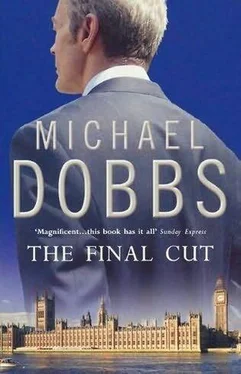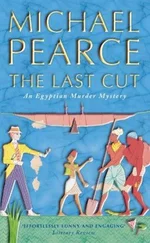Michael Dobbs - The Final Cut
Здесь есть возможность читать онлайн «Michael Dobbs - The Final Cut» — ознакомительный отрывок электронной книги совершенно бесплатно, а после прочтения отрывка купить полную версию. В некоторых случаях можно слушать аудио, скачать через торрент в формате fb2 и присутствует краткое содержание. Жанр: Политический детектив, на английском языке. Описание произведения, (предисловие) а так же отзывы посетителей доступны на портале библиотеки ЛибКат.
- Название:The Final Cut
- Автор:
- Жанр:
- Год:неизвестен
- ISBN:нет данных
- Рейтинг книги:5 / 5. Голосов: 1
-
Избранное:Добавить в избранное
- Отзывы:
-
Ваша оценка:
- 100
- 1
- 2
- 3
- 4
- 5
The Final Cut: краткое содержание, описание и аннотация
Предлагаем к чтению аннотацию, описание, краткое содержание или предисловие (зависит от того, что написал сам автор книги «The Final Cut»). Если вы не нашли необходимую информацию о книге — напишите в комментариях, мы постараемся отыскать её.
The Final Cut — читать онлайн ознакомительный отрывок
Ниже представлен текст книги, разбитый по страницам. Система сохранения места последней прочитанной страницы, позволяет с удобством читать онлайн бесплатно книгу «The Final Cut», без необходимости каждый раз заново искать на чём Вы остановились. Поставьте закладку, и сможете в любой момент перейти на страницу, на которой закончили чтение.
Интервал:
Закладка:
'What's wrong with my tie?' he demanded defensively.
'Remember, Geoffrey, the job of Home Secretary is to share miseries and explain away disappointment. Why policemen are towing away shoppers' cars instead of cutting off football hooligans' goolies, that sort of thing. You're not supposed to look as if you're enjoying it.' She smiled mischievously and headed for the Cabinet Room door.
Hell, would no one allow him to relish the moment? 'That's not all a Home Secretary might do,' he countered. 'Francis and I have got plans.' His tone suggested a conspiracy of friendship and great secrets, an alliance which no one dare mock. And it had stopped her in her tracks, he was pleased to note.
She turned to face him. 'If you're going to screw the electorate, for pity's sake don't wear a tie advertising the fact.' Then she was gone, entering through the Prime Minister's door without knocking.
COURT OF ARBITRATION
For the Delimitation of Maritime Areas between the Republic of Cyprus and the Provisional Republic of Northern Cyprus.
PRESIDENT: Mr Clive Watling. MEMBERS OF THE COURT: Mr Andreas Rospovitch, Mr Michel Rodin, Mr Shukri Osman, Mr Farrokh Abdul-Ghanem… The Court, composed as above, makes the following decision… that while Greek Cypriot fishermen have traditionally fished in these waters, and the two sides have agreed quotas enabling those Greek Cypriot fishermen currently engaged in fishing these waters to continue so as to ensure that their livelihoods may be protected, such traditions of access and the other 'special circumstances' raised by the Greek Cypriot side cannot override the geographical features that lie at the heart of the delimitation process…
Moreover, notwithstanding the fact that independent seismic surveys have indicated little potential exploitable mineral resources on the continental shelf, there is in any event no reason to consider such mineral resources as having any bearing on the delimitation…
In the view of the Court there are no grounds for contending that the extent of the maritime rights of either side should be determined by matters of equity as they relate to the past history of the island. The legality of the Turkish invasion of 1974 is not a matter for consideration by this tribunal, which recognizes the long-standing de facto jurisdiction of the Turkish Cypriot authorities in the northern portion of the island…
Both Parties, in rebutting their opponent's claims, tend to contradict the very principles they have invoked in support of their respective positions. The Court must assure itself that the solution reached is both reasonable and equitable, and to that end, bearing in mind the legally binding assurances provided to Greek Cypriot fishing interests by the Turkish Cypriot authorities… For these reasons: THE COURT OF ARBITRATION, by three votes to two, being in favour President Watling and Judges Osman and Abdul-Ghanem, and against Judges Rospovitch and Rodin, draws the following line of delimitation… With a final check of the wording, Watling signed the definitive document. It pleased him more than he could describe. An historic agreement that would help cement both peace in a troubled comer of the world and his place amongst textbooks and precedents which would be passed down to future generations of international jurists. There was also the peerage. His mother could enjoy toasted teacakes on the terrace any time she wanted now, while he would never more want for invitations to California, anywhere for that matter, including test matches. They'd be proud of him, back in Cold Kirby-by-the-edge-of-the-Moors. The Judgment of Watling Water. A fine judgment – a fair one, too, which couldn't always be said about such matters. Now it was done and whether they discovered oil, antiques or the bones of the Minotaur didn't matter a damn – and should never have mattered. This was a judgment of law, not a poker game with drilling licences.
Justice. British justice. And if it entailed screwing the French into the bargain, then the bargain was all the better for it. Rodin could rot in hell. It had developed into a silent tussle of wills. The BBC cameraman kept adjusting the angle repeatedly in order to gain an uncluttered view of the Prime Minister and his announcement in front of Number Ten – it was, after all, Urquhart's moment – but the new Foreign Secretary was intent on basking in the sunshine of television lights and the reflected plaudits. With the persistence of an outbreak of measles the rotund outline of Bollingbroke kept insinuating itself into the picture until he was standing to attention, suit buttons straining, immediately behind the Prime Minister's right shoulder. Urquhart's Praetorian Guard.
One of the private secretaries had suggested that perhaps the statement should have been made to Parliament rather than to the media, but Grist -good Grist, whose instincts were so sound – had captured Urquhart's mood. On the doorstep of Downing Street there was no Leader of the Opposition to throw up supercilious questions and comment, no former-and-recently-fired Minister to claim part of the credit, nothing to prevent Urquhart from occupying the top slot on the lunch-time news all by himself. Except for Boilingbroke. Maybe next time they would truss him to a chair.
Thus had a grateful nation been given the opportunity to witness F.U. expressing his delight at turning closed minds into the open hands of friendship, accepting the accolade of Statesman. Formally inviting the leaders of both Cypriot republics to fly to London in eight weeks' time for the signing of the final and definitive peace accord – and thus providing him with another glorious media binge and guaranteed victory in an arena where no other British politician could even enter. Francis Urquhart. Man of Peace. In a small floral-patterned room on the top floor of 10 Downing Street, at the eastern end of the living quarters which are so small, so unbefitting the head of a major Western government, and so very English in their understatement, Elizabeth Urquhart sat at the Regency desk which had once been her grandmother's. She pushed aside the letters she had been answering and with a small key unlocked the drawer, taking from it her private address book. There was a slight tremble to her fingers, the sense of anticipation she had known when riding to hounds as they were about to down a great stag. An inward struggle between excitement, fear and – conscience? The hand reached out, no longer for crop or reins but the telephone, the one she'd installed many years before when they had first moved in. The telephone which did not go through the switchboard. Her phone, for her purposes. The quarry had been cornered, there was good news she wished to share. But not with too many people. 'I regret, Mr President, that the air-conditioning plant has broken down again.'
A knot of anxieties had tangled around the aide who was soaked in sweat from his recent spittle-scattered brawl with the engineering supervisor. It had been to no effect, the temperature was still rising rapidly into the eighties. The two fans he had placed in the comers of the room seemed to have negligible impact on the heavy Nicosia air, which smelt and tasted as though it had been breathed many times before.
Nures, a man of passion and varied temper, seemed to bear no trace of ill will. He had removed jacket and tie, sipped sweet mint tea and was mopping his receding brow with a large red handkerchief. He was also poring over a map, and exulting.
'Soon we shall have new air conditioning – all of us. And new roads. Schools. Homes. A new airport, even. No longer to be outcasts.' His dark eyes shimmered with hope. 'A fresh start.'
'We have much to be grateful for,' the aide offered damply, trying to push along the unexpected tide of good humour.
Читать дальшеИнтервал:
Закладка:
Похожие книги на «The Final Cut»
Представляем Вашему вниманию похожие книги на «The Final Cut» списком для выбора. Мы отобрали схожую по названию и смыслу литературу в надежде предоставить читателям больше вариантов отыскать новые, интересные, ещё непрочитанные произведения.
Обсуждение, отзывы о книге «The Final Cut» и просто собственные мнения читателей. Оставьте ваши комментарии, напишите, что Вы думаете о произведении, его смысле или главных героях. Укажите что конкретно понравилось, а что нет, и почему Вы так считаете.












